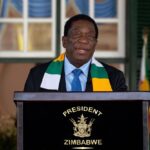Zimbabwe’s telecommunications landscape has been significantly altered by the arrival of Starlink, Elon Musk’s satellite internet constellation, promising high-speed internet access across the nation, even in remote areas where access to services like BetWinner paris sportif has been limited due to poor connectivity.
Its launch earlier this month has ignited hopes for improved connectivity, particularly in underserved rural areas where traditional infrastructure is lacking. However, the government’s assurances of equal treatment for Starlink alongside local providers have raised some eyebrows.
This move, coupled with the government’s embrace of new technologies as articulated by Information Minister Jenfan Muswere, who stated that “information communication technologies are developing at a rapid pace worldwide hence the country has to embrace the new technologies for its growth,” signals a willingness to adapt to advancements in the sector.
The government has tightened its grip on Starlink in Zimbabwe and has made it clear that Starlink will not receive preferential treatment regarding taxation.
ICT Minister Tatenda Mavetera stated during a post-Cabinet media briefing, “When it comes to taxes, they are all the same. Whatever is going to apply to local ISPs is also going to apply to Starlink. That is why you see us penalising them if they are not providing efficient connectivity.”
This commitment to equitable taxation is reinforced by the fact that Starlink falls under the same licensing category as other internet service providers (ISPs), with the exception of those operating under legacy licences with terms of 14 or 20 years.
The new licensing regime, however, reveals a significant disparity in licensing fees. While incumbent internet access providers like Liquid, Dandemutande, Powertel, Telco, and Africom reportedly paid US$5.5 million for their legacy licences, mobile and fixed operators (Econet, TelOne, and NetOne) paid significantly more – US$137 million and US$100 million respectively. The government has not disclosed the licensing fees paid by state-owned companies. In contrast, Starlink’s reported licensing fee is US$575,000 – the same amount paid by network service providers and Wicknell Chivayo’s IMC communications.
This discrepancy in licensing costs raises questions about the government’s claim of equal treatment. Furthermore, the recent introduction of hefty fines for poor service, outlined in Statutory Instrument (SI) 154 of 2024, adds another layer of complexity.
These regulations, enforced by the Postal and Regulatory Authority of Zimbabwe (POTRAZ), impose penalties ranging from US$200 to US$5,000 per infringement for unreliable service. Performance will be assessed over three months based on various key indicators, including call drop rates, data service access success rates, and internet speed.
Interestingly, while the government insists on equal treatment, certain actions by POTRAZ appear to contradict this assertion. POTRAZ has banned the unauthorised resale of Starlink products, a measure not applied to the sale of products from established providers like Liquid Telecoms or TelOne. This selective enforcement raises concerns about potential inconsistencies in the regulatory framework.
The introduction of these new regulations, coupled with the arrival of Starlink, marks a significant turning point for Zimbabwe’s telecommunications sector. While the government aims to foster competition and improve internet access, the apparent discrepancies in licensing fees and enforcement raise questions about the true extent of its commitment to fair and equal treatment for all players in the market.
The long-term impact of Starlink’s presence and the government’s regulatory approach remains to be seen. The potential for increased competition and improved services is undeniable, but the path to achieving this goal appears to be fraught with complexities and potential inconsistencies.
The launch of Starlink in Zimbabwe was certainly not a smooth one as it reportedly involved a lot of politics starting with the announcement of allowing Starlink to operate in Zimbabwe being made by President Emmerson Mnangagwa himself.
Award-winning journalist Hopewell Chin’ono revealed on X that a meeting took place in Harare just before the launch of Starlink involving representatives from Starlink, DHL, the Secret Service, the defence ministry, and ZIMRA, the Zimbabwe Revenue Authority.
Chin’ono, citing sources within Starlink, alleged that authorities proposed a 40% stake in the company’s local operations for Wicknell Chivayo’s IMC, with the controversial Mutapa Investment Fund (MIF) receiving 10%. This proposal was reportedly rejected by Starlink, who stated that the other parties were offering little beyond political influence.
“My Starlink source told me this morning that they rejected the deal because the other parties were not bringing anything to the table except political capital. The Starlink Africa and Middle East contact informed me that they will be shipping the first 1,500 test kits this coming week via DHL, and they should arrive in Harare within the week for pre-go-live regulatory local compliance activities by POTRAZ,” said Chin’ono a few hours after Starlink’s official launch in Zimbabwe.












